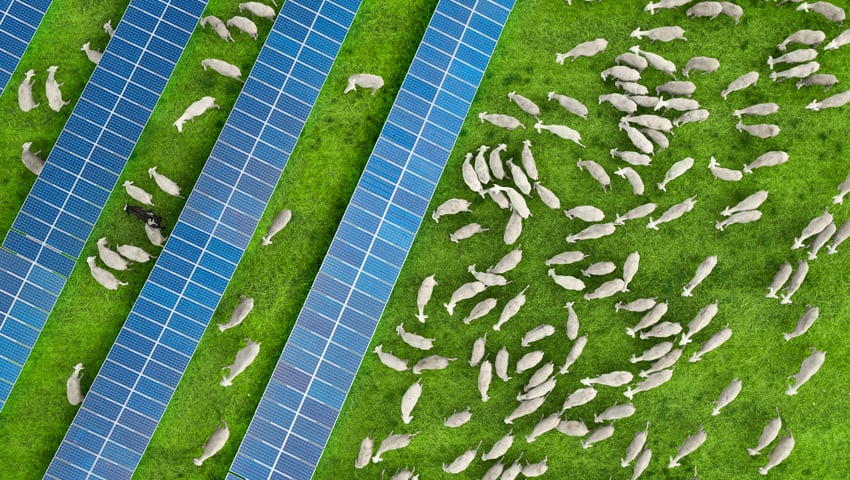By John Sturman, Managing Director of NatPower UK
Climate change is the major threat to farmers, and decades of unsustainable farming practices are exacerbating its impacts. Farmers and landowners are confronted with soaring costs of energy, animal feed and fertilisers, extreme weather and changing consumer demands.
Research shows that arable farmers in the UK stand to lose almost £1 billion on crops in 2024 compared to 2023. Couple this with the significant decrease in agricultural subsidies since 2021 and we can see that farmers are under pressure to preserve their livelihoods.
With high energy prices, risks to energy security and the commitment to net zero, the UK Government is committed to building a national clean energy system by 2030. With increased demands for sites for renewable energy projects – wind, solar and energy storage – farmers and landowners are well-positioned to benefit.
This changing landscape could offer a huge opportunity for farmers. Recent research has shown that, by using just 3 per cent of land in England, the UK could produce 13 times more renewable power than it does now. On top of this, there are many opportunities for dual land use where renewable projects are sited, through technologies like agrivoltaics. These combine energy generation with food production on the same piece of land, offering numerous benefits such as preserving more farmland for food production, increasing biodiversity, as well as an additional revenue stream.
By exploring diversification opportunities on their land such as solar or battery storage projects, as part of a mixed land use strategy, farmers can not only feed the UK, but power it too, increasing their revenues and improving farming practices in the process.
Using land for renewable energy offers a short-term fix to farmers’ earnings and a long-term solution for restoring exhausted land. These projects provide long-term revenues and can help preserve the rural economy for the next generation.
The financial security that this provides means farmers can expand the potential of their land, modernise equipment and update practices, and secure themselves against food price fluctuations, while also enabling the transition towards more sustainable farming for the long term – it is a win-win-win solution.
Diversifying farming businesses
Hosting renewable energy projects, through the lease or sale of portions of land, is about more than just finance. For example, an on-farm grid connection for a solar farm or battery can provide charging stations for electric vehicles and provide power for existing infrastructure like milking equipment – all using clean energy.
Such projects can also support land regeneration, helping farmers to secure additional sources of revenue through new agri-payments for using more sustainable practices. The ability to decarbonise farm operations and improve sustainability can also provide a value-add for customers, meeting the increasing demands for higher sustainability standards.
Nature-positive farming
Alongside the government’s clean energy target, its 2030 biodiversity target means more sustainable and regenerative practices are an essential part of the future of farming.
Hosting clean energy projects can help to achieve this. For example, developers who partner with farmers must deliver a biodiversity net gain of at least 10 per cent on the land projects are built on. As a developer, NatPower UK is committed to delivering at least double that for all projects.
This biodiversity uplift on the land leased by the developer, from wildflower meadows, hedgerows, native trees and livestock integration can also improve soil health and allow land to regenerate and rest, and provide a higher income stream from the land than farming operations alone.
Benefitting local communities
Alongside these benefits for landowners, renewable energy can also positively impact local communities. Using the revenues generated from projects, developers like NatPower UK create dedicated community funds, working in partnership with local people to ensure they benefit from clean energy projects developed in their area.
For example, this could fund free electric vehicle charging points, power local infrastructure like the town hall, or help to access new technologies such as heat pumps, that can reduce the cost of energy – ensuring that the benefits of clean energy projects are felt throughout the community, from farm to home.
A new dawn for farming
Renewable energy projects can lead to a net-positive future for farmers and communities. By hosting new power sources, farmers can diversify their businesses, creating new income streams while continuing food production and grazing.
This can provide a competitive advantage amidst increasing demand for sustainable practices, while also reducing costs through clean energy access, greater grid connectivity and lower energy costs – all of which can be utilised by the local community.
In a changing world, it’s clear that farmers need to future-proof their businesses. With the UK energy transition now in full swing, this offers an opportunity to secure their future for generations to come.
